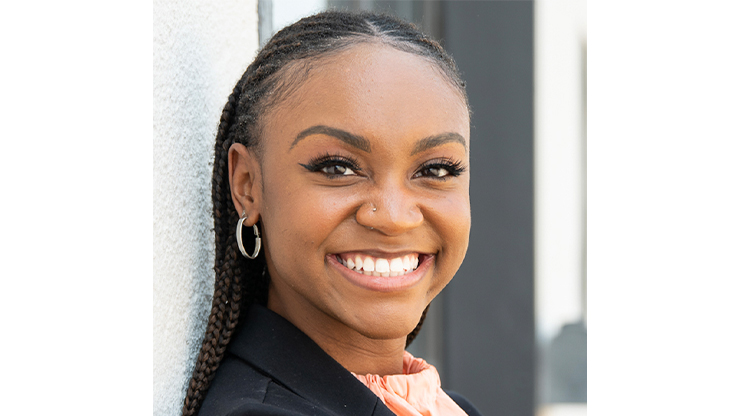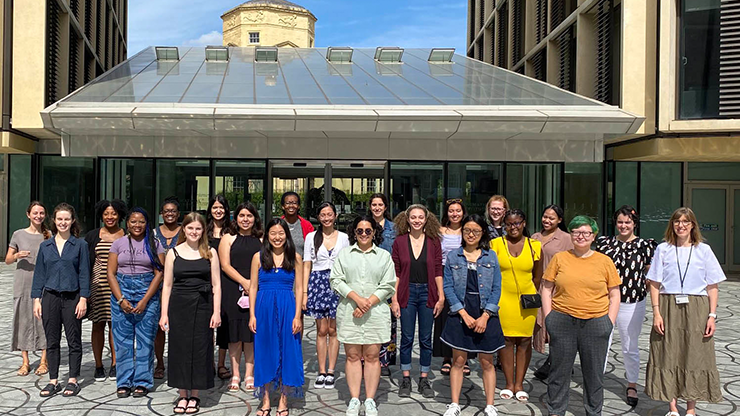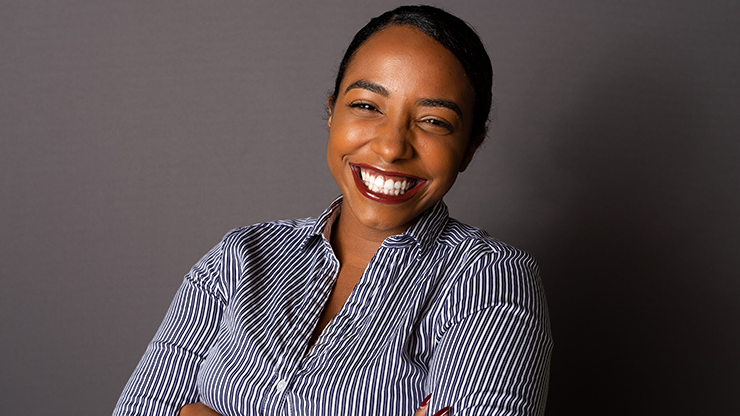A Peek Into the EDGE Experience: Reflections From the 2025 SIAM EDGE Fellow

My journey towards a career in mathematics is truly something that I never could have imagined. During my junior year at Howard University, I switched my major from chemistry to mathematics and immersed myself in the mathematical community. My current reality as a recent graduate with a B.S. in mathematics is far from how I had originally envisioned my postgraduate life as a chemist, but in the best way. This auspicious change is due in part to all of the wonderful people that I’ve met along the way, my willingness to embrace unexpected challenges, and my perpetual stubbornness and resilience in the face of adversity.
I must admit that my confidence during the graduate school application process was initially low. I was riddled with self-doubt and missed a lot of wonderful opportunities by preemptively counting myself out. Because I didn’t focus on mathematics until well into my undergraduate years, I believed that my mathematical maturity wasn’t developed enough for graduate school; I even considered taking a gap year and gaining additional experience to make myself a stronger candidate. Yet despite my insecurities, I applied to several graduate programs in applied mathematics, committed to pursuing my Ph.D. at Howard, and tried to conceptualize a rough idea of what my future might look like.
One piece of advice that I’ve always held close is courtesy of Rebecca Betensky and Vardia Duterville of New York University’s Pathways into Quantitative Aging Research Summer Program. When I participated in the 2024 program, they urged me to go to as many conferences as possible and build meaningful connections. So when I was fretting about my career decisions, I took their advice. In January 2025, I attended the Joint Mathematics Meetings (JMM) in Seattle, Wash., where I met a few women who had completed the Enhancing Diversity in Graduate Education (EDGE) Summer Program. They spoke about how EDGE had become a beacon in their career endeavors and encouraged me to apply. On January 15 (coincidentally, my birthday), I had my first direct interaction with the EDGE community when I was invited to an EDGE webinar by Shakuan Frankson of the U.S. Census Bureau (and participant of the 2020 EDGE Summer Program) titled “The Power of Community: Learning From EDGE Alumni.” This webinar introduced me to all of the “Women Math Warriors” who have flourished professionally since their involvement with EDGE. They talked about their respective journeys and detailed the ways in which EDGE helped them advance. This praise from the webinar—along with the positive remarks from JMM attendees and the encouragement of Dennis Davenport, my advisor at Howard—convinced me to apply to the 2025 EDGE Summer Program.
I still remember the day that I got the email about my acceptance to EDGE. I was in the checkout line at the grocery store and was immediately overcome with excitement and validation that I’d made the right career decision in pursuing mathematics.
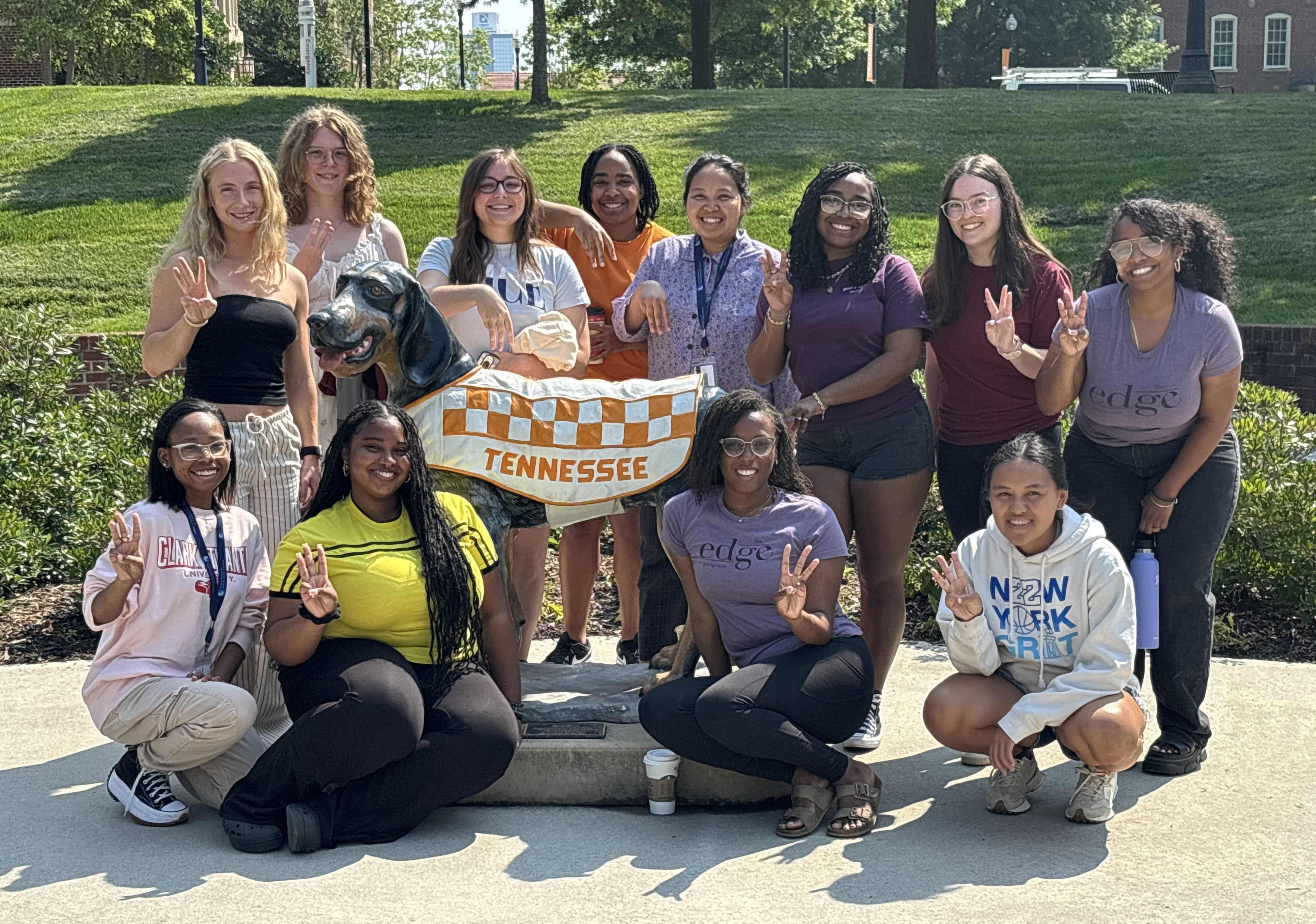
On June 1, I made my way to the University of Tennessee, Knoxville, for my monthlong stint as an EDGE scholar. On the first day, I was full of nervous jitters as I looked around at my fellow cohort members, mentors, instructors, and local hosts. A defining tenet of EDGE is learning to vocalize your identity in the mathematical world. As such, we were immediately asked to each pick an animal—lion, squirrel, whale, or eagle—that we felt represented us as mathematicians. I selected an eagle, since they soar high in the sky and explore a lot of ground from a bird’s-eye view but can swoop down and become nestled in reality when something catches their attention.
The first two weeks of the program were the most intimidating. I like to joke that EDGE is similar to graduate school, but with 100 times the intensity. Our lives were full of proofs for real analysis and “linear a-bstract-lgebra,” as our instructor Catherine Buell of Fitchburg State University would say. We spent our nights working through homework assignments, leaving us with just enough sleep to make it to lectures the next morning. Although the rigorous schedule was an adjustment for all of us, we quickly learned how to prioritize difficult tasks and lean on each other for help.
At first, I thought that constantly asking questions and seeking clarification at study sessions was a sign of weakness. I was worried about being judged or seeming like I didn’t belong. But I soon realized that this insecurity was all in my head — my curiosity and willingness to step outside of my comfort zone made me a better mathematician. As we transitioned to more advanced courses in MATLAB, numerical analysis, and measure theory, we found a balance and encouraged each other to learn to the best of our abilities during our short time at Knoxville. We closed out the program with final presentations, and it was amazing to witness and reflect on all of our achievements as both individuals and a collective. Personally, I chose to apply a numerical analysis concept to a classic game in game theory; this project allowed me to improve my proficiency in MATLAB and create my first Beamer presentation, both goals that I had hoped to achieve during the summer.
In addition to the skills that I gained, the bonds I formed with other members of my cohort are truly invaluable, and I will cherish them long into my career. I genuinely could not have picked a better set of people with whom to experience EDGE. While there were so many wonderful moments, one memory that stands out is our first group huddle as a cohort — courtesy of fellow participant Amira Claxton of the University of Texas at Arlington (who, incidentally, participated in the inaugural SIAM-Simons Undergraduate Summer Research Program in 2023). Before that point, most of us were struggling in silence and just trying to make it through; being vulnerable with each other brought us closer together and changed the trajectory of the following weeks. On our last day, we parted with a group hug and a much-needed reflective chat. This moment solidified our connection outside of mathematics and makes me especially excited for Reunion Weekend! The thought of once again doing the “Women Math Warrior dance”—created by EDGE President Ami Radunskaya of Pomona College—keeps me motivated.
As a cohort, many things defined our bond: Jason’s Deli ice cream, personality tests, the card game Exploding Kittens, and binge-watching Love Island. Our genuine friendships augmented our approach to learning, which evolved into a group endeavor with mutual gain. Being able to rely on each other became second nature, and the imagined guilt of burdening the rest of the cohort faded away. We all wanted each other to not only succeed, but truly understand. This dynamic was so beneficial, and I really hope to recreate it in graduate school.
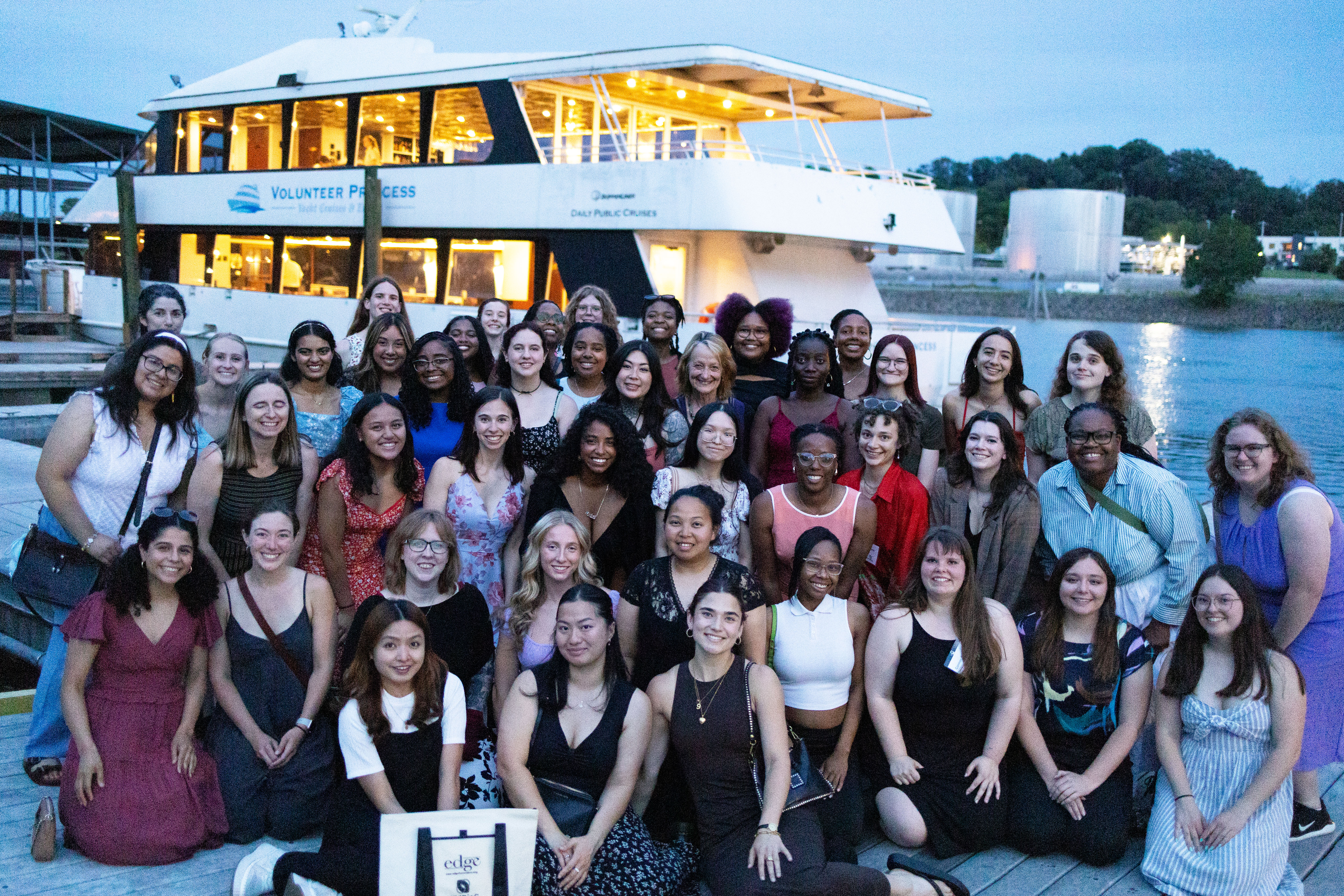
EDGE has both reshaped me as a student and exposed me to a variety of teaching styles that I intend to emulate one day. The lecturers went above and beyond, and each instructor embodied certain traits that I have since implemented as a teaching assistant at Howard. For example, Noelle Sawyer of Southwestern University was an absolute comedian and continuously started her sessions in high spirits, posing a new question every day. Catherine Buell was so patient during office hours and always offered a useful example to further my understanding of a concept. Erica Graham of Bryn Mawr College lectured with engagement, approached questions with compassion, and offered great advice. And Jenna Zomback of the University of Maryland has one of the best board workups that I’ve ever seen, which is a total inspiration. Each of the four faculty members left a sizeable impression on me; it was a privilege to learn from women in mathematics, especially since that has been such a rarity throughout my schooling.
In addition to the spectacular instructors, we also had amazing directors. Candice Price of Smith College and Alison Marr of Southwestern University, co-directors of the EDGE Summer Program, were lovely to be around; our lunches with them were simply the best. They made genuine efforts to understand and uplift each of us, and I honestly could not have asked for more from either of them. At the end of the program, I was honored to learn that the directors and faculty had selected me as the 2025 SIAM Edge Fellow.
As I embark upon my first year as a Ph.D. student at Howard, it has been challenging to develop a routine and manage the many responsibilities of graduate school. But I can confidently say that without EDGE, this adjustment process would have been much harder. During the EDGE Summer Program, I demonstrated a level of resilience that I didn’t even know I had. EDGE helped me realize that I can dedicate myself to my studies, produce great work, and facilitate a sense of community among my peers. I learned that even when assignments are difficult, my drive and support network will push me towards the finish line. EDGE has equipped me with the necessary tools to succeed as both an aspiring mathematician and a young professional in control of my future.
I am beyond thankful to have had the privilege of experiencing EDGE this past summer. Being recognized as the SIAM EDGE Fellow is certainly a high honor, and it’s a pleasure to know that my effort, intellect, and personality shone though. It was even sweeter to receive this acknowledgment the same year that I reinstated the Howard University SIAM Student Chapter as the former undergraduate president. I look forward to continuing my involvement with the SIAM community—perhaps by attending a future SIAM conference—and want my story to inspire other students to not count themselves out and always accept new adventures that offer the chance for learning and growth. If you’re a young woman who is working towards a Ph.D. in mathematics, then EDGE is the place to be. I can’t wait to see what my future career will look like; I know it will be fruitful due to the wonderful mathematical family that I’m building today. I’m so grateful that EDGE has become an integral part of my journey.
About the Author
Cheyene Henry
Ph.D. Student, Howard University
Cheyene Henry is a first-year Ph.D. student in mathematics at Howard University. She earned her B.S. in mathematics with a minor in chemistry from Howard in 2025. Henry’s research explores the interdisciplinary application of mathematical principles to problems in biostatistics, game theory, and theoretical fusion. She is also dedicated to fostering diversity and mentorship within the mathematical sciences.

Related Reading
Stay Up-to-Date with Email Alerts
Sign up for our monthly newsletter and emails about other topics of your choosing.



